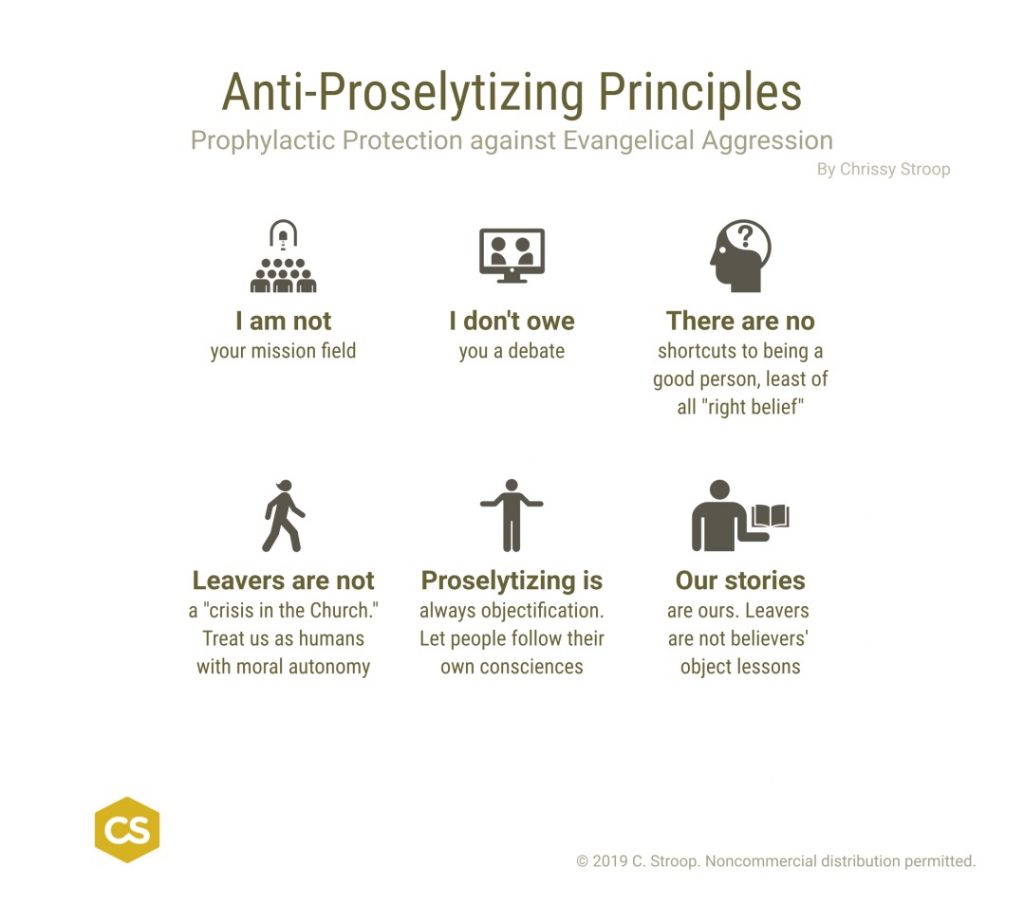Excuse me, reader, but would you have a moment to talk about the obnoxious practice of asking people to talk about “our” lord and savior? In a previous piece for RD, one of the reasons I gave for why America’s conversation about Christianity is “fundamentally unserious” is that our elite public sphere systemically silences “the voices of leavers, nonbelievers, and religious minorities in discussing Christianity and ‘religious freedom.’”
As a case in point, I brought up Christianity Today columnist Bonnie Kristian arguing in The Week that any objection to the Christian practice of proselytizing must be based in either partisanship or ignorance of Christianity. As her assertion of this clearly false dichotomy demonstrates, if we’re to take her at her word, Kristian is unable to conceive of literally any serious reasons someone might find proselytizing unethical or distasteful, since, after all, it’s an aspect of Christianity that is “extremely old and (within the church) uncontroversial.”
Whether conversion efforts are controversial outside the church is apparently immaterial to Kristian, and I probably couldn’t come up with a more obvious example of unexamined Christian privilege if I tried. I’ll also just note in passing that justifying a practice on the basis of its being “very old”—the appeal to tradition—is a logical fallacy. The cruel practice of slavery is “very old,” but very few people are willing to openly argue for its validity today.
In any case, the occasion for Kristian’s tone-deaf musings was social media outrage over then US Representative-elect Madison Cawthorn discussing his efforts to convert Jews and Muslims to Christianity in an interview for Jewish Insider. Kristian’s bizarre testiness and pedantry on this issue may indicate that her personal ignorance on the matter is willful.
But if Kristian is truly unable to imagine any deeply felt, substantive reasons for anyone to object to Christian proselytizing, she is clearly the one in need of an education. And yet, sadly, Kristian is far from alone in her defensiveness around Christian conversion efforts.
As someone who spends entirely too much time on Twitter, I encounter this defensiveness often when discussing the Christian hegemony that pervades our society and the reasons I personally find proselytizing objectionable. I’ve summarized these reasons in the following infographic, which I repost often:

But my philosophical objections to proselytizing notwithstanding, there are plenty of historical reasons why Christians proselytizing to Jews is a particularly fraught issue, and anyone pretending to be an intellectual should be familiar with them. I mean hell, you could get some sense of it just from watching Fiddler on the Roof. Bonnie Kristian is, to go all Pauline for a second, very much “without excuse” here, and, while I’m not Jewish and certainly don’t claim to speak for Jews, I think it’s worth pausing on this point.
Jews were a stateless people for about 2500 years, living in diaspora under various non-Jewish powers, some of which treated their Jewish populations better than others. Today, a significant proportion of the world’s Jews reside in the modern state of Israel, founded in 1948, but more than half of the global Jewish population is spread throughout other parts of the world, with the largest concentration outside Israel in the United States.
In medieval Western Europe, where the notorious blood libel—the false belief that Jews need the blood of a ritually murdered Christian boy to make Passover matzah—originated, Jewish communities’ positions were always tenuous relative to the Christian rulers in power.
The Jewish population was expelled from England in 1290, and Jews and Muslims were expelled from the Iberian Peninsula in 1492, after which even those who had converted to avoid expulsion were subjected to suspicion, surveillance, and vicious persecution by the Spanish Inquisition.
Where Jews were (shakily) tolerated in Europe, antisemitism was still widespread, and violence was an ever-present possibility. Discrimination was de rigueur, and conversion to Christianity was often held out, coercively, as a means of gaining access to jobs and other privileges Jews were banned from.
The last blood libel trial, known as the Beilis affair, was decided in 1913 in the Russian Empire (specifically modern Ukraine), where anti-Jewish pogroms frequently followed the scapegoating of Jews by state actors. (These nineteenth- and early twentieth-century pogroms also resulted in many Jews emigrating to the United States, where treatment was better, but they were still very much second-class citizens.) While the jury acquitted Mendel Beilis himself, its members made a point of insisting that they remained convinced the Christian murder victim in question had been the subject of a Jewish ritual murder. And then there was the Holocaust, the systematic murder of some six million Jews by the mostly Christian Nazis.
Just so you know, this attitude is incredibly offensive to non Christians. Our experience with Christianity is often violent. Christian does not mean good person or vice versa. Christians need to accept that you share something with these people.
— Wendy 🍒 (@cherriesandgin) January 9, 2022
If centuries upon centuries of Christian violence perpetrated against Jews and the resulting generational trauma don’t constitute a serious enough reason to object to proselytizing for Kristian and her fellow travelers, perhaps they’re beyond hope. It’s important to consider power dynamics here, and how conversion efforts by members of the Christian majority reinforce Christian supremacy and privilege in our society. But in any case, it shouldn’t take centuries of violent persecution of one religious group against another to understand what’s wrong with proselytizing.
Frankly, all it should take is a little basic empathy and an understanding that, pluralism being a given of modern societies, a democratic and equitable approach demands that we treat those who are different from us with respect, even if we have the formal right not to. To clarify that last point, I am not advocating that we ban conversion efforts; that would be an illiberal assault on free speech. But I am advocating that we work to change the hearts and minds of our fellow citizens until proselytizing becomes a serious faux pas.
With that in mind, let me lay out a few of the most common objections I get when I criticize proselytizing, along with refutations of these bad (and bad faith, so to speak) arguments.
Proselytizing is a demand of the Christian religion (and some others)—deal with it.
In addition to what I said above, let me note that religions are what their adherents make of them. Their teachings are always subject to communally mediated interpretation, and they are reformable. Some Christians interpret the so-called “Great Commission” (Matthew 28:19-20) as a call to humanitarian action rather than efforts to convert people specifically to Christianity.
Others take the fairly benign approach of simply trying to live out their faith as an example of a righteous, upstanding life, and won’t bother anyone about their beliefs unless they’re asked. No matter what anyone tells you, Christians don’t have to hand out tracts, badger, or behave manipulatively toward those in their lives who don’t share their beliefs. So let’s stop coddling those who insist that they do.
To be clear, the manipulation I’m referencing isn’t only an aspect of particularly rude, clumsy approaches to proselytizing, which always entails making people into projects. “Polite” proselytizing and so-called “friendship evangelism” are as supremacist and objectifying as more directly aggressive conversion efforts.
I have a friend who is a pastor. She rarely ever speaks to me about anything religious and when she shares personal stories, they are either funny or meaningful outside of a religious context. If she can keep her evangelical behavior from me, anyone can. It’s basic decency.
— Faj Inez (@CoolKrista) January 9, 2022
Isn’t any attempt to persuade someone of anything proselytizing? So, aren’t you just a hypocrite then?
I have a hard time believing that the people who assert this wildly false equivalence actually believe it themselves, but I suppose some of them do. Thus, it apparently needs stating that not every effort I make to convince someone of something is of existential importance, and that efforts to convince or persuade can be made without assuming the position of superiority that proselytizing entails.
Proselytizing goes to the very core of someone’s identity. The person attempting to convert someone else to their religion does so because they believe that their religion is superior (which may be combined with a sincere concern that those who refuse to convert will be eternally tortured). Proselytizing also involves appeal to divine authority, which means the ordinary rules for evidence are not in play.
proselityzing attempts to change identity while debate or discourse attempts to change ideas. Is that right?
— Jake Dockter (@JakeDockter) January 8, 2022
Proselytizing is a very specific thing.
It’s not suggesting that hey you should totally try this restaurant I like.
It’s not an open intellectual debate where we have recourse to observable evidence.
Come on, people. Stop with the false equivalence.
— Chrissy Stroop (@C_Stroop) January 9, 2022
A related issue that evangelical-turned-humanist Bart Campolo and I have argued about on his HumanizeMe podcast is whether it’s ethical to form relationships with other people on the basis of hoping to change them—an example of which is the manipulative evangelical practice of “friendship evangelism.” I was surprised to learn that there are some, like Campolo, who believe this isn’t much of an issue. As Campolo sees things, vying for influence is one of the most fundamental aspects of any human relationship, which is a point of view on relating that I frankly find troubling.
By contrast, I believe that friendships need to be forged around some organic connection, some aspect of common ground and that shared values are essential for a close friendship, whereas befriending someone who’s different so you can deliberately try to change them–particularly if you plan to try to change something central to their identity–is objectification, and therefore unethical. In any case, no matter how you slice it, proselytizing is not the same as me telling a friend they should try my favorite sushi place or arguing that, for example, voting for Republicans is harmful and unethical.
I was a mark, and potential trophy 🏆 to be bagged, for several friends who were Christian Youth Group fanatics. The more I debated them, the more they wanted me. It was exhausting.
— Robin Britton (@robinbritton11) January 9, 2022
in my experience, proselytizing often traveled with a companion, too: the fake friendships children and teenagers were asked to form with their classmates as part of manipulating them. that shit was straight-up evil. some of us were just marks to people we considered friends…
— pavel 🇺🇦 (@thepavel) January 9, 2022
Asking not to be proselytized to is the same as proselytizing.
This one is particularly aggravating, and in my experience it comes up a lot. Defensive Christians in particular may suggest that, since their religion demands that they attempt to convert others, my asking them not to do so is me asking them to “change their religion.”
This is not just nonsense; it’s abusive nonsense. Any time someone responds to your attempt to set a boundary with some version of “If I respect your boundary, I am violating my religion,” you should feel free to tell them that their religious freedom ends where your own religious freedom and moral autonomy begin. The fundamental fact remains that you haven’t asked them to change their mind about anything; you’ve only asked them to leave you alone.
If we want to have a functional pluralist society at all, we need people, broadly, to respect such boundaries. Stalking and harassment shouldn’t get a pass simply because they’re driven by a particular understanding of the majority religion, and establishing a boundary—a practice essential to forming and maintaining healthy relationships—is simply not the same as trying to convince someone of something, let alone to change their most sacred beliefs from whatever “inferior” ones they hold now to the “superior” ones that you hold.
It’s relentless. Every proselytizer seems to think they’re the first to try, rather than just the latest in a long line, going back to our childhood for many of us. What’s just a conversation to them is inescapable, lifelong harassment to us. https://t.co/Ca9kCNKMF5
— Rachel (@RachelNeedsANap) January 9, 2022
Democratic citizenship demands the active embrace of pluralism, or what I like to refer to as “practicing pluralism.” I think it’s important for nonbelievers, religious minorities, and liberals and leftists to talk about what concepts like pluralism and religious freedom mean to us, since otherwise we cede the whole discussion to conservative Christians and their enablers, who de facto insist that anything supported by a substantial proportion of Christians should be off-limits to legitimate criticism. This majoritarian, Christian supremacist bias has always been oppressive and harmful, and in a rapidly secularizing America, the argument that this is simply “the way things are” is going to become untenable sooner or later.
It may take a great deal of time and effort to shift the conversation about these matters in our civil society, but it’s important to try. One demand we must consistently push is that religious minorities and the nonreligious be granted more and better-quality media representation, and that we be given a seat at the table in order to express our views on religion and society in our own voices. For many of us, those views include condemnation of proselytizing.
I hope I live to see the day when proselytizing is widely considered socially unacceptable in American polite society. But if I only live to see the day that the Bonnie Kristians of the world can no longer get away with claiming in a major secular media outlet that no one could have serious, substantive reasons for objecting to Christian conversion efforts… that, at least, will be something.





